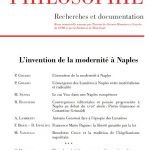 Volume 80, Issue 3, July-September 2017
Volume 80, Issue 3, July-September 2017
The Invention of Modernity in Naples

Pierre Girard, The Invention of Modernity in Naples
The purpose of this introduction is to determine the ambiguous status of “Napolitan Philosophy”. We intend to show to what extent the specific features of this philosophy are not abstract values linked to its vague and indefinite nature, but rather the expression of particular historical conditions which give such a system of thought its full meaning. Such a perspective makes it possible to delineate a real philosophical tradition which expresses a modernity original in its development and its methods of dissemination.
Pierre Girard, The Birth of Modernity in Naples, between Materialism and Radicalism
This essay analyses the introduction of modernity in Naples in the second half of the Seicento. Beyond the myth of the return of Tommaso Cornelio said to have introduced modernity in Naples by bringing back with him the books of modern authors upon returning from a trip, this essay shows to what extent this very modernity was introduced within a decisive social, political, sanitary and geological context. A double perspective that takes into account the specific reception of Cartesian tradition and materialism makes it possible to understand the original position of the Napolitan novatores as well as the crisis they went through at the end of the century.
Manuela Sanna, The Instance Vico in an European Naples
The essay aims to include the works of Vico into the cultural environment in which they are historically placed and to recapture in this context the notes of originality of some philosophical Vichian themes. Among them, in the foreground, the treatment of the ingenuity and its use in the gnoseological and cognitive discourse. Vico allows, through the examination of these concepts, to think better and in a new way the idea of history and of humanity through the thread of poetic knowledge.
Raffaele Ruggiero, Publishing Crossroads and Enlightenment Philosophy in Naples at the Beginning of the 18th Century: Pietro Giannone and Costantino Grimaldi
At the beginning of 17th century, in Naples there was a peculiar intersection between the development of free thinking (based on the diffusion of the Cartesian thought both in philosophy and in the scientific researches) and the issue of a powerful middle class that engaged a successful battle against the feudals prerogatives, thanks to their juridical skills. This situation gave to the Neapolitan Enlightenment a peculiarity both in the cultural life and in the politics of the kingdom. Pietro Giannone and Costantino Grimaldi was two protagonists of this age and they had the same misfortune.
Andrea Lamberti, Antonio Genovesi and the Enlightenment
Antonio Genovesi gives a fundamental contribution to cultural renewal of the Kingdom of Naples. From theology, to metaphysics, to the political economy, he faces the challenge opened by the new philosophical perspectives of Enlightenment. If he doesn’t provide systematic solutions and responses, his civil philosophy reorganizes a considerable part of 18th century culture in an original synthesis that remains an essential instrument of interpretation for the successive generations of Neapolitans intellectuals who have to deal with the political crisis of the end of the century.
Francesco Berti & Dario Ippolito, Francesco Mario Pagano: Freedom Guaranteed in Law
Mario Pagano was author of philosophical, literary and juridical writings. He crossed the boundaries of the Enlightenment despotism, exploring the land of constitutional republicanism, until the experience of Revolution. Starting from a theory of historical development and from a doctrine of natural rights, he argued that the main goals of the political power is to protect individual freedom and to achieve social equality. This essay tries to highlight the most important aspects of his intellectual biography.
Marco Vanzulli, Benedetto Croce and the Tradition of the Neapolitan Hegelianism
The question at stake in this text is the relevance of the tradition of the Neapolitan Hegelianism in Benedetto Croce’s philosophical education. Neapolitan Hegelianism school is culturally hegemonic at Naples after Italy unification, but it is declining at the end of the century when the opposite tendencies of positivism and neo-Kantism take over. These are the years of the young Croce’s education. We’ll focus on Croce’s debt to the debate between positivism and neo-Kantism, whose motives will still determine last Croce’s positions and choices.
Odo Marquard, In Praise of Polytheism. On Monomythical and Polymythical Thinking
In his essay “In Praise of Polytheism”, Marquard points out the limits and dangers of framing human history as a process of demythologisation. While freeing humanity from its myths might be illusory, he nonetheless argues that their critical examination is a necessity. Indeed, when they leave humanity with one unique reading, some stories are pernicious. These stories, such as that of Christian salvation or the myth of progress, limit human possibilities in eschatological terms. Conversely, a multiplicity of myths gives way to human freedom. Marquard makes a claim for a “polymythy” and an enlightened polytheism, whose pluralism is equally political, narrative and philosophical.
